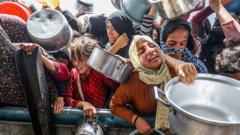As the humanitarian situation in Gaza deteriorates, the UN has characterized Israel's blockade as a strategic weapon of war, stoking fears of mass starvation and potential genocide.
Gaza Faces Historical Hunger Crisis as UN Warns of Potential Genocide

Gaza Faces Historical Hunger Crisis as UN Warns of Potential Genocide
UN agency head labels Israeli blockade a 'weapon of war' amid humanitarian catastrophe in Gaza.
Israel's blockade of Gaza has plunged the region into a severe humanitarian crisis, with the head of the UN Palestinian Refugee Agency, Philippe Lazzarini, claiming that humanitarian aid is being weaponized. In a recent interview, Lazzarini expressed his growing distress over the dire conditions faced by residents as food supplies dwindle to critical levels. Over two million Gazans now live under grave threats of starvation, exacerbated by the Israeli government's decision to halt all humanitarian aid since early March 2023.
According to humanitarian organizations, including the International Committee of the Red Cross, Gazans face overwhelming challenges, marked by threats from hostilities and severe deprivation of aid. Lazzarini painted a grim picture, noting that starvation is spreading and that without immediate aid, many Gazans will succumb not to bombardment but to lack of food. The situation has been further complicated by renewed military action following a two-month ceasefire, as Prime Minister Benjamin Netanyahu's government has drawn criticism for prioritizing military objectives over humanitarian concerns.
The UN warns that 70% of Gaza is already inaccessible to its residents, while Israel's plans may further restrict them into an even smaller area. Notably, Lazzarini defined the ongoing blockade as a strategy to exert pressure on Hamas, serving as a stark reminder of the complex interplay between military strategy and humanitarian considerations. The burgeoning crisis has seen rising calls for accountability, with some accusing Israel of committing war crimes and potentially genocide.
Lazzarini did not shy away from labeling the blockade's effects as catastrophic, noting that 22% of the population is facing conditions defined as Phase 5, the most severe classification for famine. As families are forced to relocate in search of safety, Lazzarini indicated that the destruction of essential services and infrastructure further deepens the humanitarian impact.
International reactions have varied, with some political factions in Israel accusing Lazzarini of misrepresentation, while others in the global community express growing concern over Israel's military strategy and its humanitarian implications. Calls for actions from the International Criminal Court and other international bodies indicate a turning tide in the global perception of the conflict.
As Lazzarini pointed out, the ongoing humanitarian crisis should serve as a watershed moment, a clear message of the urgency to resolve the conflict in a way that prevents future atrocities and acknowledges the rights and needs of all affected parties. The rhetoric around Gaza is becoming increasingly charged as the international community grapples with its responsibility toward one of the most distressed populations on the planet.
According to humanitarian organizations, including the International Committee of the Red Cross, Gazans face overwhelming challenges, marked by threats from hostilities and severe deprivation of aid. Lazzarini painted a grim picture, noting that starvation is spreading and that without immediate aid, many Gazans will succumb not to bombardment but to lack of food. The situation has been further complicated by renewed military action following a two-month ceasefire, as Prime Minister Benjamin Netanyahu's government has drawn criticism for prioritizing military objectives over humanitarian concerns.
The UN warns that 70% of Gaza is already inaccessible to its residents, while Israel's plans may further restrict them into an even smaller area. Notably, Lazzarini defined the ongoing blockade as a strategy to exert pressure on Hamas, serving as a stark reminder of the complex interplay between military strategy and humanitarian considerations. The burgeoning crisis has seen rising calls for accountability, with some accusing Israel of committing war crimes and potentially genocide.
Lazzarini did not shy away from labeling the blockade's effects as catastrophic, noting that 22% of the population is facing conditions defined as Phase 5, the most severe classification for famine. As families are forced to relocate in search of safety, Lazzarini indicated that the destruction of essential services and infrastructure further deepens the humanitarian impact.
International reactions have varied, with some political factions in Israel accusing Lazzarini of misrepresentation, while others in the global community express growing concern over Israel's military strategy and its humanitarian implications. Calls for actions from the International Criminal Court and other international bodies indicate a turning tide in the global perception of the conflict.
As Lazzarini pointed out, the ongoing humanitarian crisis should serve as a watershed moment, a clear message of the urgency to resolve the conflict in a way that prevents future atrocities and acknowledges the rights and needs of all affected parties. The rhetoric around Gaza is becoming increasingly charged as the international community grapples with its responsibility toward one of the most distressed populations on the planet.



















